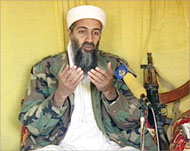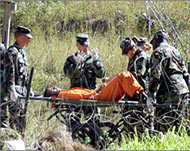Guantanamo prisoner denies charges
A Yemeni prisoner accused of being Usama bin Ladin’s errand boy has appeared before a review hearing, denying charges against him and saying he had been mistreated by American troops in Guantanamo and Afghanistan.

The bearded and shackled prisoner with bloodshot eyes has been held at the US military outpost in Cuba’s Guantanamo Bay for nearly three years.
He is accused of training at an al-Qaida camp in Afghanistan in 1995. He was also accused of running errands for bin Ladin and fighting for the network.
The man, who journalists are prohibited from naming, at the hearing on Wednesday, said he was studying until 1996 in Yemen, married in 2000 and moved to Pakistan and Afghanistan to teach the Quran.
He denied being a member of al-Qaida or having connections with Afghanistan‘s ousted Taliban government. He also said he never fought against US or coalition forces, and never received any weapons training.
Enemy combatants
“I stayed in Afghanistan for about a year,” the 25-year-old said through an Arabic translator and before a three-member panel charged with deciding whether some 550 prisoners are being properly held as enemy combatants, a classification with fewer legal protections than prisoners of war.
 |
|
Yemeni prisoner was accused of |
“I don’t understand how a person in a year can become such an important person, a guard or someone who runs errands. You know more about the Taliban than me.”
There have been more than 134 cases that have gone before the tribunals since they began on 30 July, a little more than a month after the US Supreme Court ruled that Guantanamo prisoners have a right to challenge their detentions in federal courts. Only one man has been freed.
The review hearings are separate from the military commissions meant to try charged prisoners, but both proceedings have come under attack by lawyers and human rights groups.
Criticism
One of the criticisms over the review hearings is that the prisoners are only allowed to hear the unclassified evidence against them. Another criticism is that some of the information came from murky sources, or through interrogations.
An allegation the prisoner took issue with was a statement from an interrogator that the prisoner wrote a letter stating his intention to become a religious martyr, which was allegedly found in the car of Usama bin Ladin’s driver and guard.
 |
|
American troops were accused of |
“I never wrote such a letter and I would like to know what interrogator provided this information,” said the prisoner, shackled to the floor of a trailer that was used as an interrogation chamber and now used for the review tribunals.
Another accusation was that he spent time with bin Ladin and was often seen by his side.
“What is a long time? Who saw me with bin Ladin?” he asked the tribunal president who shrugged. The identities of the panel members are not disclosed.
“Are you trying to make me an enemy combatant?” the man asked.
Studies
The man said he was studying at a religious institute in Yemen until 1996, when he was 17-years-old. After he married, he moved to Afghanistan so he could teach in Khost but his wife stayed at a house in the city of Kandahar.
 |
|
Over 134 prisoners have |
When the war began he said he decided to go back to Yemen, but he first tried to get to Khost to say goodbye to his students and pick up books and other belongings. The road, however, was blocked because of the fighting so he made his way to Pakistan where he was captured.
After more than a week in a Pakistani jail, he was put in US custody in Kandahar.
“We were tortured in Kandahar,” he said, not elaborating. “As soon as we were brought to Cuba, and up until now, we’re still being pressured and mentally coerced. I had heard the United States was a friend of human rights, a friend of justice, but since we’ve been imprisoned, we’ve seen the exact opposite of that. We’ve found no justice here.”
Although the hearings are open to the media, most of the hearings go uncovered because there are more proceedings taking place – seven were scheduled for Wednesday – and journalists are not allowed to stay on the base for extended periods of time.
Unclassified
|
“This is the first time I’ve been in a court like this” Unnamed Yemeni prisoner, |
Unclassified portions of the government’s allegations are provided to media who do not attend the hearings but the prisoner’s testimony – which often contradicts many of the government’s allegations – is not provided.
“This is the first time I’ve been in a court like this,” he said, visibly frustrated over the source of allegations against him.
The panels have ordered only one prisoner to be released to Pakistan. More than 64 men have been ordered held as enemy combatants while the other cases are pending.
All cases of the some 550 prisoners at the camp are to be reviewed by the end of the year.
On Tuesday, six cases went before the tribunals, including two men who boycotted the proceedings, a Saudi who said he received training to fight in Chechnya and a 30-year-old who claims he was forced to join the Taliban in Tajikistan. The other cases were still pending.